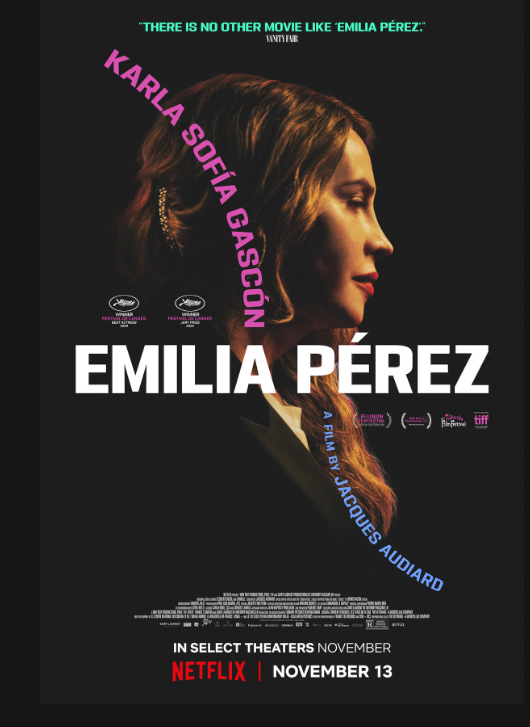
Netflix's promotional poster for "Emilia Pérez."
The 2025 Oscars held many nominations for popular, innovative, and even controversial films. One of the so-called ‘rivalries’ of this year’s Academy Awards was between the two blockbuster musical movies of the year: “Wicked,” which follows the backstory of Elphaba, the Wicked Witch of the West, grappling with the discrimination she faces and her desire to be known while blossoming a friendship with the good witch Glinda, and “Emilia Pérez,” which follows a lawyer helping a cartel boss retire and transition to living as a woman.
Though wildly different, “Emilia Pérez” and “Wicked” were pitted against each other in the award for Best Original Song, with many even questioning the former’s very nomination when the latter was not only one of the best-selling movies of its year but had always been one of the most loved musical soundtracks in the theater community. The difference between the songs in Wicked and Emilia Pérez is strikingly obvious. Wicked, for example, focuses deeply on lyricism that well expresses the characters’ deepest emotions and personalities. Meanwhile, Emilia Pérez’s music is merely a vessel for conversations that could have been spoken instead of put to a melody that is not structured in any pleasing way.
Take an excerpt from lyrics for “Defying Gravity” from “Wicked” for example:
This is poetic expression of the main character’s emotions and arc, which is defining to the plot. Originally written for a Broadway musical, where lyricism, among other elements of music, would be the only way to communicate and therefore worded to a tee, this song balances emotion with songwriting and poeticism with realistic depictions of speech.
Now take those well-crafted and thought-out lyrics and pit them against the words of a song from “Emilia Pérez”:
The lyrics here are plain, simple, inelegant, and unnecessary. There was no reason for this to be put in the movie at all, aside from context, and certainly no reason to make it a song with terrifyingly unorthodox and music-theory-defying melodies. In addition to the horrible lyricism, the song goes on to repeat the last two lines for the entire last minute, which only screams lazy songwriting and boredom for the listeners.
Writing aside, “Emilia Pérez” suffered major controversies such as racist allegations, anti-Mexican comments, and accusations that every community represented was represented poorly. Mexican-Americans have spoken out about the inaccurate representation and the trivialization of crime and illegalities. “Wicked” did not suffer the marketing or publicity pitfalls that its opposition did. Instead, “Wicked” was one of the most widely enjoyed films of 2025, bringing the nostalgia of formerly musical theater songs to an entirely new genre of audiences. Other nominations for Best Original Song also included “Never Too Late,” written by Elton John and Brandi Carlile. The movie did not have the success or publicity that either “Wicked” or “Emilia Pérez” had, but the song is written by a legend in the music industry and easily rivals the inadequacy of any “Emilia Pérez” song.
Finally, the talent showcased within the winner for Best Original Song is far beneath the talent showcased in “Wicked” or “Never Too Late.” The lack of singing technique, production experience, and overall conveyance of emotions on Selena Gomez and Zoe Saldana’s part is glaringly obvious when pitted against Cynthia Erivo’s powerhouse vocals or Elton John’s incredible piano playing.
In conclusion, while “Emilia Pérez” may have sparked some conversation, its win for Best Original Song was undeserved when compared to the legendary songwriting of Elton John and Brandi Carlile and the superior craftsmanship of “Wicked.” The lack of depth in both the lyrics and musical structure of the songs from “Emilia Pérez,” combined with the controversies surrounding the film, is far from the true artistry that should have been recognized at the 2025 Oscars.